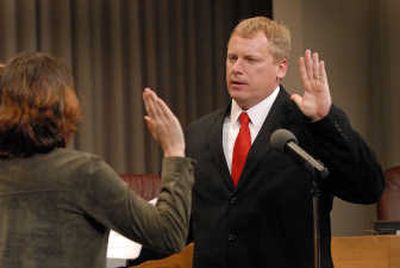Council appointee stresses service

He has never given money to a political campaign.
He had never met an elected city leader until this month.
He has never been to a neighborhood council meeting.
And he doesn’t plan to run for office.
But Michael Allen, an Eastern Washington University administrator, emerged two weeks ago from among 26 applicants as the winner of the contentious appointment process to replace Mayor Mary Verner on the Spokane City Council.
After the bitter political battle over the selection process, Allen’s apolitical nature, council members say, was the key to his appointment.
“He didn’t have a dog in any fight,” said Councilman Nancy McLaughlin.
Allen’s appointment was made possible by outgoing Councilman Brad Stark. Stark had vowed not to participate in the selection process so the matter could be delayed and Rush would get the vote. But as council debates grew increasingly tense, Stark broke that pledge. Allen was chosen on a 4-2 vote, making Stark’s vote integral to his selection.
Rush had argued that as the newly elected councilman from the South Hill, his voice was more representative.
“If I had been involved, I think the (selection) would have been different, but I’d like it to be history,” Rush said after he and Allen were sworn in. “He seems like a real good guy and I’m looking forward to working with him.”
While Allen and Rush may not be a consistent voting block (Allen said he supported Ronald Reagan in the 1980s, while Rush was more of the Jimmy Carter and Walter Mondale persuasion), there are some signs that the two might get along. Exhibit A: Allen said he voted for Rush over Stark because he felt Rush represents an important voice on the environment and development.
In the mayor’s race, however, Allen said he voted for Dennis Hession because he wanted consistency in the city’s top office. Rush was a strong supporter of Verner.
Allen says he considers himself a moderate, siding more often with Democrats on social issues and more often with Republicans on fiscal matters.
His opinions on recent high-profile City Council decisions are similar to the majority already on the council.
He supports domestic partner benefits for city employees. He believes there is enough evidence to point to human activity as a major contributor to global warming. He supported the city’s decision to provide tax subsidies to the Kendall Yards development. He says the city was correct to settle lawsuits over the financing controversy surrounding River Park Square, which is owned by Cowles Co., the same company that owns The Spokesman-Review.
Allen moved to Spokane to attend EWU in 1985. He didn’t finish his degree and worked several different jobs before he and his wife moved to Wenatchee in 1995. There, he worked as an investment officer and small business loan officer at US Bank. After that, he bought Ames Brothers Coffee, a coffee distribution business that he sold before moving back to Spokane in 2000.
After finishing his finance degree at EWU and earning a master’s in business administration, he was hired by the university to be its assistant athletic director of business operations. He left for a year in 2004 to work for the Ambassador Group, but soon returned to EWU to be its associate athletic director.
A few months ago, he became the university’s director of corporate and foundation relations. In that job, Allen’s role is to raise money.
“Mike is not a polarizing individual,” said his boss at EWU, Vice President for University Advancement Michael Westfall. “He is very reasoned, very thoughtful and just a very solid person and a professional.”
Westfall, who also was Allen’s boss when he served as interim athletic director earlier this year, said he doesn’t believe Allen’s new public life will hurt fundraising – either because of Allen’s new time commitments or the positions he’ll take on City Council.
“He really stressed that he saw this move as a civic decision and not a political decision,” Westfall said.
During the interview process for the City Council job, Allen said he doesn’t expect to run for the job in two years.
If he doesn’t change his mind, that means he won’t have to earn voter approval. But Allen says that doesn’t mean he won’t be accountable to his constituents.
“Anytime you’re in a public position you’re accountable to the public in general, and if you do your due diligence and make sure that you’re meeting them so that you’re fairly representing them, I think that will take care of itself,” he said.
McLaughlin pointed to former Councilman Rob Crow, who was appointed to a two-year term in 2006 and opted not to run for election. Although he only had 22 months on the job, Crow led a successful effort to end an eight-year stalemate to develop city land into a park near Joe Albi Stadium.
Allen was at a board meeting for CenterStage, a performing arts nonprofit agency, when the City Council made the decision.
“I was as shocked as anyone else when my named popped out on Monday night,” said Allen, who has resigned his board membership at CenterStage to make more time for City Council duties.
He says he hopes to pull an equal amount of time – 40 hours a week – working on city business as he will at his day job.
“I expect over the next two years to be very, very busy balancing the city, Eastern and, obviously, my family,” Allen said.
Elected Spokane leaders say that after a bitter fight over the appointment process, they expect more harmonious decision making.
“What disappointed me most was the acrimony among council members,” said Verner. “I trust that during the holidays folks will have had a chance to relax and refresh and come back with a willingness to put that behind them and work together in the new year.”